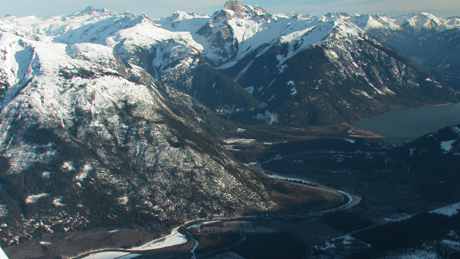
Like a lot of people who live in Campbell River, Daniel Andrews came here never intending to stay. He and his wife arrived 15 years ago for a visit, and ended up putting down roots and raising a family.
Andrews says he liked the landscape, loved the fishing. He worked as a guide for a while, then started a window washing business. I catch him on the job, soaping and scraping clean the large panes along Campbell River's waterfront.
I ask him about the Bute Inlet project, a major hydro development planned for the northern sunshine coast -- about 60 kilometres from Campbell River's shores. Private power has got the rest of the province talking. Is it a hot issue here?
"Certainly, with the election, yes," he says. "But I'd say it's like anything else. People are pretty well split on it."
A Jehovah's Witness, Andrews says he doesn't care for the politics around it. He's sure there is misinformation coming from both opponents and proponents of the project, but isn't sure what to believe.
There is surprisingly little research out there on how run-of-river projects -- particularly large scale, multi-stage developments like the green power corridor -- will affect watersheds, the lifeblood of the province.
As a result, say experts, we're in the middle of a dangerous experiment.
Paltry baseline data on RoR projects
There was a lot of run of river news last week: reports, petitions and press conferences, all addressing a similar laundry list of concerns about the projects; they aren't regionally planned, they aren't well-monitored, they won't benefit local communities.
These are the kinds of ideological debates that have garnered a lot of media attention, says Craig Orr of the Watershed Watch Salmon Society.
"But we still don't have a lot of basic information about these projects," he says. "We know there will be impacts, but we just don't know how severe. And science is a pretty poor driver for public policy."
Robert Millar, a professor in the civil engineering department at UBC who specializes in hydrology, says there isn't a lot of research on run-of-river, so it's difficult to make sweeping statements.
Generally speaking, he says there is a consensus that climate change will cause reduced river flows in the future. So, although run-of-river proponents are obligated to abide by water extraction rules -- they can divert as much as 80 per cent of a river's flow -- in the future that might amount to less water.
And there's very little baseline data to begin with, says Millar. Even with projects that have reached construction stage, he says, the hydrology of the rivers, which ultimately determines how much power you're going to produce, is not well understood.
"Typically, when IPPs are going to bankers, they are required to do a minimum of one-year of flow data, which isn't very much," he says.
"An operation might find that for a month a year they are unable to divert water because [levels] would be too low. But it may turn out that, either with climate change or because the hydrology is not well understood, low-flow periods might persist for longer."
Environmental assessments 'lack rigour': biologist
Biologist Rachel Holt is an environmental consultant in Nelson who has worked for run-of-river proponents before. She says these projects have the potential to be green, but a fundamental flaw is the lack of a strategic assessment of where to put them, and where not to.
The Liberal government tends to point out that project proponents are subject to environmental assessments. In Holt's opinion, the process itself "lacks rigour because of the dearth of environmental laws, for instance, to protect species," she says.
"The environmental assessment process also does not assess cumulative impacts at all," she says.
It's a concern that has been shared widely by conservation groups. In 2001, the West Coast Environmental Law Society reported on the breakdown of B.C.'s environmental protection legislation -- something that appears to be ongoing.
And, according to a recently-leaked government document, British Columbia's Environment Ministry wants to chisel away wildlife protection measures even more in the face of run-of-river development.
These details add up to a disturbing picture: a willingness to compromise the ecological integrity of watersheds in order to accommodate power projects that might not be viable in 50 years time.
"It's a short-term gain for a long-term loss," says Kent O'Neil, a guide who runs helicopter fishing tours in the Bute Inlet. His clients pay thousands for the privilege of fishing in first-class wilderness in a region that has remained wild because of its inaccessibility. You need a jet boat or a helicopter to get in, and even then it can be dangerous.
Opposition from municipal officials
Local governments around here are not interested in becoming part of the green power corridor for the province.
The Strathcona Regional District unanimously passed a motion in June 2008 asking for a two-year moratorium on new water licenses and environmental permits for run-of-river projects, and last month the Association of Vancouver Island and Coastal Communities passed an emergency resolution calling for a moratorium, and an integrated sustainable energy plan for the region.
"The whole issue of the B.C. energy plan has been drawn into question because of this [Bute Inlet] project," says regional district director Jim Abram.
"In order to figure out what we need, what's the best technology to use, and where we can put it. We need to do this as a public process provincially, so we can stop fighting these things one-off all around the province."
Related Tyee stories:
- War over River Power Escalates
Industry, foes clash over massive private Bute Inlet project. - BC's Clashing Shades of Green
How 'run of river' and global warming are splitting enviros this election. - Tapping Our Wild Rivers Can't Fix Climate Change
Veteran enviro says no to Tzeporah Berman's 'PowerUp' logic.
Read more: BC Votes '09: Your Issues
















Tyee Commenting Guidelines
Comments that violate guidelines risk being deleted, and violations may result in a temporary or permanent user ban. Maintain the spirit of good conversation to stay in the discussion.
*Please note The Tyee is not a forum for spreading misinformation about COVID-19, denying its existence or minimizing its risk to public health.
Do:
Do not: